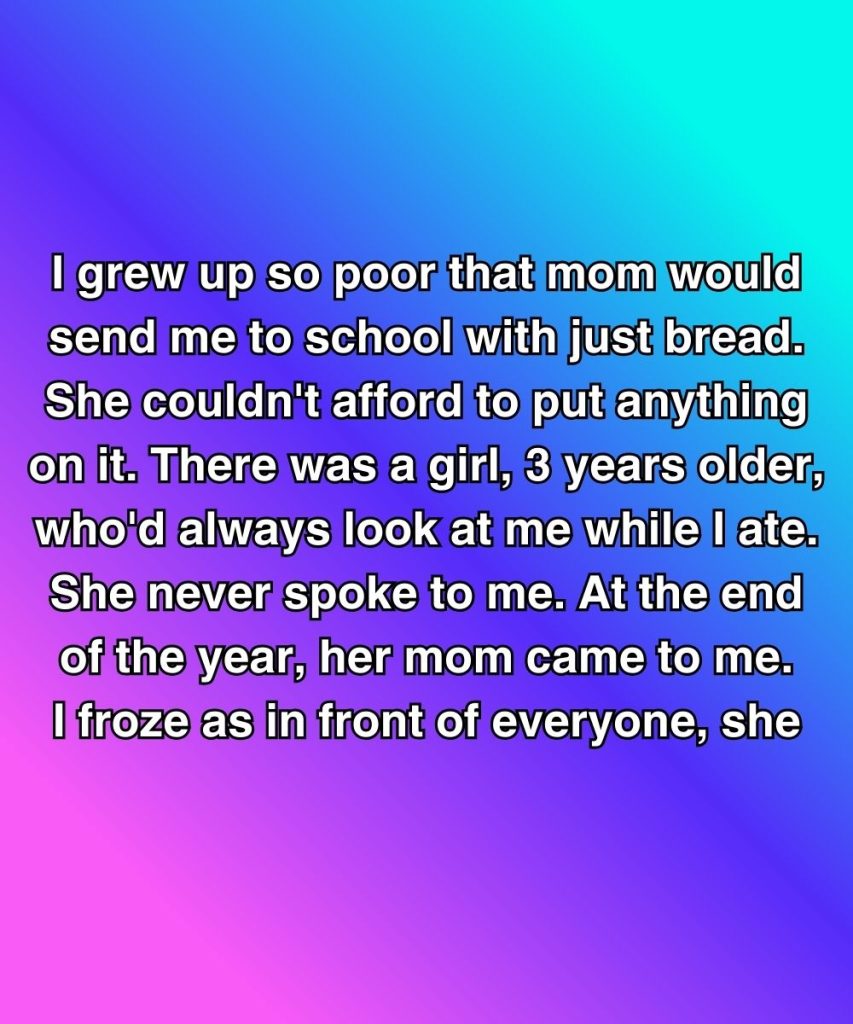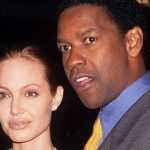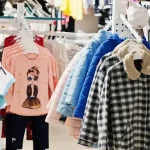I was the kid with plain bread.
Mom would wrap two slices in wax paper and send me to school. No butter, no cheese—just bread. There was a girl three grades above me who watched me eat every day. Never said a word. At the end of the year, her mother knelt in front of me, took my hand, and said, “You remind my daughter of her brother. He died last year. He used to eat bread like that. Just dry bread.” I was nine. I whispered “sorry,” though I didn’t know what for.
After that, the older girl—Naledi—still didn’t speak. But sometimes there’d be something on my desk when no one was looking. A boiled egg. A mandarin. Half a peanut butter sandwich, wrapped neat. She never waited to see me find it. I always knew.
She graduated. Life kept being hard. Mom worked two jobs. I washed cars, delivered pamphlets, did whatever I could from thirteen on. Not enough time for friends, not the shoes or phone to fit in, just a steady grind and the quiet memory of someone’s small kindness keeping me from going numb.
At eighteen I bought a used camera with money I’d been stacking for years. It wasn’t fancy, but it taught me how to look. Neighborhood aunties hired me for birthdays, then weddings. I charged little because I couldn’t believe people were trusting me at all. I posted my best shots online. A photo of a barefoot grandfather dancing at his 80th went viral, and suddenly I had DMs from Cape Town to Nairobi.
Things started lifting, but hunger habits don’t quit. I still counted coins and rationed toothpaste. I still slept on a mattress on the floor in the room I shared with Mom because the roof leaked and a real bed felt like tempting fate.
Then a proper email arrived.
“Hi, I’m Naledi Nhlapo, art director at a lifestyle magazine in Joburg. I’ve been following your work. Would love to talk. P.S. I used to sit behind you in the lunchroom. Bread.”
It took a minute to breathe.
We spoke. Her voice was the same—soft, careful. She’d studied design, clawed her way up. She wanted to feature me. We met at her glass-and-steel office and I asked, “Do you remember the egg?”
“I remember all of it,” she said.
The feature changed everything. Bookings stacked. I upgraded gear. Mom quit nights. For the first time, I exhaled without guilt.
Naledi became more than a door-opener; she became a friend. Over drinks one night, she said, “You never asked why my brother only ate dry bread.”
“I figured it didn’t matter,” I said.
“He was stubborn,” she smiled. “Said if we couldn’t afford cheese, then nothing at all. Bread was his protest.”
“We’d have gotten along,” I said.
She looked at me like she saw the kid I used to be and the person I was now at the same time. It lodged deep.
A big corporate job came—Cape Town, big check, dream brief. The night before my flight, Mom collapsed. Heart. Years of stress catching up. I stayed beside her hospital bed for a week, watching numbers blink. When she woke, she asked, “Did you go?”
“No.”
She cried. “I worked all those years so you could.”
So I rebuilt slowly. Local gigs while she healed. Then bigger work again, this time with her at my side, writing down bookings, choosing which photos to print. She still laughs that people pay me to take pictures.
Then Naledi messaged: “Weird favor. Our old primary school is fundraising. They want to revamp the lunchroom and start a meal program. Will you shoot a short doc?”
I said yes before she finished typing.
Walking back onto that playground cracked something open. The fading benches. The swing that always squeaked. The wall where I used to sit with my bread.
I filmed the kids—shoes scuffed, laughter loud, cheeks too hollow on some. I talked to them. One boy said, “I don’t mind plain food. As long as I get to eat.” I went home and sat on the floor and cried into my T-shirt with the camera still around my neck.
The doc raised triple the goal. They fixed the roof, replaced the tables, and started serving warm meals every day. When I visited later, a little girl pressed half her sandwich into my hand. “You look hungry,” she said. I almost lost it right there.
Naledi watched from across the yard. When our eyes met, we both knew the circle had closed.
Years later, that doc won an award. I didn’t go. I was in a backyard photographing a grandmother turning ninety, barefoot in the grass, laughing like she’d stolen time itself. It felt like the right room to be in.
Here’s what I know now: kindness doesn’t have to be loud to last. Quiet gestures echo. You don’t know who’s watching or what your smallest act will become in someone else’s life. And if you’re the kid with just bread, keep going. Someone sees you—even if they never say a word.


